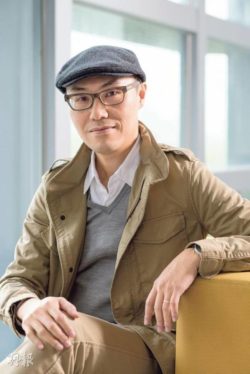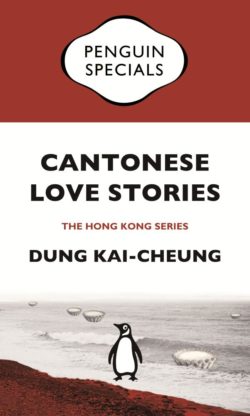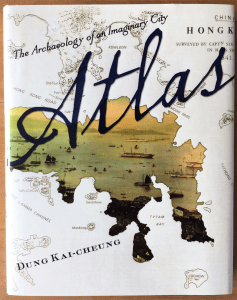 Dung Kai-cheung is an award-winning Hong Kong fiction writer, playwright and essayist. He also teaches creative writing and literature at various universities in Hong Kong. Among his books published in Chinese are Androgyny: Evolution of a Nonexistent Species (1996), Atlas: The Archaeology of an Imaginary City, The Double Body (1997), The Rose of the Name (1997), Visible Cities(1998), The Catalog (1999), A Brief History of the Silverfish (2002), Works and Creations(2005), Histories of Time (2007) and The Age of Learning (2010). Columbia University Press published Bonnie S. McDougall and Anders Hansson's English translation of his novel Atlas: The Archaeology of an Imaginary City in 2012. And in 2017 Penguin published Cantonese Love Stories (translated by McDougall and Hansson), a selection from a series of stories written just after the handover of Hong Kong to China in 1997.
Dung Kai-cheung is an award-winning Hong Kong fiction writer, playwright and essayist. He also teaches creative writing and literature at various universities in Hong Kong. Among his books published in Chinese are Androgyny: Evolution of a Nonexistent Species (1996), Atlas: The Archaeology of an Imaginary City, The Double Body (1997), The Rose of the Name (1997), Visible Cities(1998), The Catalog (1999), A Brief History of the Silverfish (2002), Works and Creations(2005), Histories of Time (2007) and The Age of Learning (2010). Columbia University Press published Bonnie S. McDougall and Anders Hansson's English translation of his novel Atlas: The Archaeology of an Imaginary City in 2012. And in 2017 Penguin published Cantonese Love Stories (translated by McDougall and Hansson), a selection from a series of stories written just after the handover of Hong Kong to China in 1997.
A collection of twenty-five narrative sketches, Cantonese Love Stories offers an intimate look into the cultural, commercial and romantic milieu of Hong Kong in the 1990s. Two lovers ruminate on the power of their photo booth stickers to keep them together. Peach-pocket Girl reads stolen love letters at a café. Pui Pui knows a Portuguese egg tart is authentic if she dreams of riding a boat-like egg tart. Each character inhabits a different corner of Hong Kong’s dreamscape; together they bring to life Dung Kai-cheung’s imaginative vision of the city.
- Penguin
Our story this month is taken from this collection. The title of 'A Bathing Ape' comes from the name of a Japanese clothing brand, and many of the stories' titles are commercial brands or fashions. In her introduction to the book, Virginia Anderson writes that the reader will 'soon discover that although Dung's characters often do derive pleasure from objects, their attitude is never merely that of a consumer, and the object never merely a commodity. Whether it is the object that transforms the human beings, making them behave in eccentric ways, or the humans who transform the object by giving it unexpected usage, this weird human-object relationship always comes down to shaping or breaking the love between humans'. (Cantonese Love Stories, 2017, p10).
You can read the story in the original Chinese here, and in English translation by Bonnie S. McDougall and Anders Hansson here.
 Dung was also one of the featured authors at our second Book Review Network Residential Weekend, in March 2018, and you can read our book reviewers' thoughts on Cantonese Love Stories here.
Dung was also one of the featured authors at our second Book Review Network Residential Weekend, in March 2018, and you can read our book reviewers' thoughts on Cantonese Love Stories here.
And last month the LARB China Channel published the text of a speech Dung gave at the University of British Columbia, on inventing Hong Kong stories:
As a writer, I can only opt for language itself as my “homeland.” A short book of mine was published in English translation last year, entitled Cantonese Love Stories. It belongs to a series put together by Penguin China to commemoration the twentieth anniversary of the handover of Hong Kong to China. It is a selection from a series of stories I wrote right after 1997. To call them “love stories” is perhaps a little deceptive but the stress on “Cantonese” is far from frivolous. It is in all seriousness a literary statement. The work is “Cantonese” both in terms of its language, which is infused with colloquial usages, and in terms of its content, which is a collection of stories reflecting local lifestyle. I do not assume that this short book or myself as a writer is able to represent the whole of Hong Kong literature. Yet as a specimen, it expresses something which is essential. It is this something that I share with many other Hong Kong writers. What is it? It is our language experience.
The language situation in Hong Kong is tricky, because for the majority who speak Cantonese there is also a rift between speech and text. When we talk and read aloud we use Cantonese, but when we write we use Modern Standard Chinese. Therefore, language practice is split into two different forms, spoken and written, which not only employ different pronunciations but sometimes even different vocabulary and grammar.
...For me, the non-equivalence between speaking and writing is more of a blessing than a curse. It is this rift between spoken and written language that instills in Hong Kong writers the awareness of the possibility of linguistic innovation. It endows me with a much richer linguistic resource and benefits me with a more acute sense of reflection. We have learnt from our linguistic experience that nothing is taken for granted, that nothing comes automatically, ready-made. All is the product of fabrication, and a matter of choice. By consciously departing from linguistic norms; Hong Kong literature challenges broader notions of unity, oneness, normality and conformity.
 You can also read an interesting review of Atlas: The Archaeology of an Imaginary City here, by the author Sofia Samatar, and another by Lucas Klein here.
You can also read an interesting review of Atlas: The Archaeology of an Imaginary City here, by the author Sofia Samatar, and another by Lucas Klein here.
The Hong Kong of Atlas is a place of rival maps and unstable language. There is joy and humor here—as in the story of water spinach and watercress—but there is also violence.
- Sofia Samatar
And there's a brief interview with Dung Kai-cheung here, from when he was the Hong Kong Book Fair's Author of the Year, in 2014.
And we're very happy that Anders Hansson took the time to answer some questions for our 'Talking Translation' series of interviews on our blog, to tell us a bit about the experience of translating Cantonese Love Stories.
 Dung Kai-cheung is an award-winning Hong Kong fiction writer, playwright and essayist. He also teaches creative writing and literature at various universities in Hong Kong. Among his books published in Chinese are Androgyny: Evolution of a Nonexistent Species (1996), Atlas: The Archaeology of an Imaginary City, The Double Body (1997), The Rose of the Name (1997), Visible Cities(1998), The Catalog (1999), A Brief History of the Silverfish (2002), Works and Creations(2005), Histories of Time (2007) and The Age of Learning (2010). Columbia University Press published Bonnie S. McDougall and Anders Hansson's English translation of his novel Atlas: The Archaeology of an Imaginary City in 2012. And in 2017 Penguin published Cantonese Love Stories (translated by McDougall and Hansson), a selection from a series of stories written just after the handover of Hong Kong to China in 1997.
Dung Kai-cheung is an award-winning Hong Kong fiction writer, playwright and essayist. He also teaches creative writing and literature at various universities in Hong Kong. Among his books published in Chinese are Androgyny: Evolution of a Nonexistent Species (1996), Atlas: The Archaeology of an Imaginary City, The Double Body (1997), The Rose of the Name (1997), Visible Cities(1998), The Catalog (1999), A Brief History of the Silverfish (2002), Works and Creations(2005), Histories of Time (2007) and The Age of Learning (2010). Columbia University Press published Bonnie S. McDougall and Anders Hansson's English translation of his novel Atlas: The Archaeology of an Imaginary City in 2012. And in 2017 Penguin published Cantonese Love Stories (translated by McDougall and Hansson), a selection from a series of stories written just after the handover of Hong Kong to China in 1997. Dung was also one of the featured authors at our second Book Review Network Residential Weekend, in March 2018, and you can read our book reviewers' thoughts on Cantonese Love Stories here.
Dung was also one of the featured authors at our second Book Review Network Residential Weekend, in March 2018, and you can read our book reviewers' thoughts on Cantonese Love Stories here.
